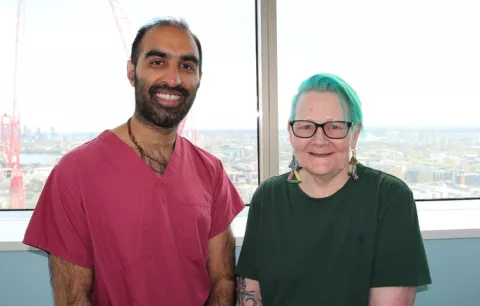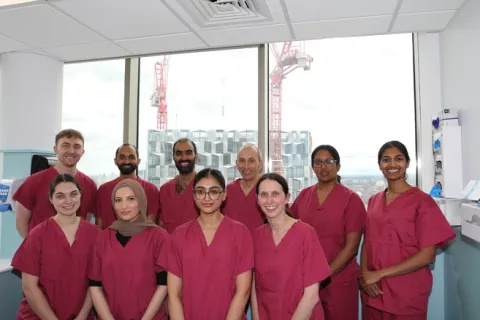New hope for cancer patients with serious tooth pain
Friday 25 October 2024

Mr Vinod Patel and Cathie O'Neill
A solution to safely remove teeth in cancer patients in desperate need of oral surgery has been developed, offering a vital new option for thousands of people across the UK.
Currently, patients taking certain cancer and osteoporosis medications are advised not to have any invasive dental treatment, such as tooth removal, after starting treatment. These medications affect the jaw bone’s ability to heal, and when paired with surgery, significantly increases the risk of the jaw bone dying, known as osteonecrosis.
This complication can be incredibly painful and there is no guaranteed cure. It has life-limiting implications including repeated or continual infection, loss of teeth, difficulty eating and it can impact ongoing cancer and osteoporosis care.
To avoid triggering osteonecrosis, dentists can be understandably reluctant to remove teeth in these at-risk patients, which may lead to excruciating pain with no viable treatment options to resolve their tooth ache.
However, a clinical review published today in the British Dental Journal by a team at Guy’s and St Thomas’ offers a solution. It presents a new four-step protocol with greater than 99% success rate in removing teeth in these patients without causing any osteonecrosis, whilst causing minimum disruption to their cancer care.
As the number of people being treated for cancer increases and the cancer survival rates continue to improve, more people are considered at risk of osteonecrosis and unable to have routine tooth extractions than ever before. This review offers hope to this growing patient group who have an increased risk of developing jaw necrosis.
The protocol, which aims to reduce the risk of necrosis at every surgical step whilst ensuring patients can resume their cancer treatment as soon as possible, has 4 key steps:
- First, dental surgeons take a 3D scan of the tooth to ensure there is no death of the jaw bone present before beginning treatment
- Then, the patient’s dentist and oncologist consult about their cancer care. Some patients undergoing active cancer treatment may need to pause a single cycle of their chemotherapy to ensure the best chance of the gum healing after surgery, and reduce the risk of infection
- Next, the tooth is removed and the dental surgeons then open the gum to polish, smooth and clean the bone socket before closing the gum again. This radical technique, known as alveoloplasty, helps to fast forward the healing process and protect the wound. Previously, it was thought that this could trigger osteonecrosis, as opposed to prevent it
- After surgery, patients are administered antibiotics to prevent infection
The review looked back at 46 cancer and osteoporosis patients with an increased risk of developing medicated-related osteonecrosis of the jaw who had surgery using the new protocol. A total 124 teeth were extracted, and 0% of these patients developed necrosis after surgery.

The dental oncology team at Guy's and St Thomas'
Cathie O’Neill, 71, has successfully had all her teeth removed using this new protocol. Following 30 years of osteoporosis treatment and a breast cancer diagnosis in 2016, Cathie was initially treated for medication-related necrosis of the jaw by oral surgery consultant Mr Vinod Patel in 2019. After successful treatment of the osteonecrosis, several years later Cathie began to suffer from painful tooth ache.
Cathie, from Camden, said:
The dental teams said they shouldn’t take out my teeth as it could cause necrosis again, but those teeth weren’t good teeth – they were frail, sensitive, I struggled to eat, and I was in pain more often than not.
Despite being considered one of the highest-risk patients for tooth extraction given her previous history with osteonecrosis, thanks to the new protocol, Cathie was able to have all her teeth removed in December 2023 and healed well. Cathie, who earlier this year retired after 20 years in the fundraising office at the Salvation Army, said:
“It was absolutely the right decision and the best thing that could have happened to me. Eating was so difficult before the surgery, so I’m so happy to be able to eat chips again!”
Guy’s Hospital has the biggest dental oncology service in the UK, and has treated over 400 patients with medication related necrosis of the jaw and manages over 200 patients at-risk of the condition each year. The team of over 20 clinicians, led by Mr Vinod Patel, work in tandem with the cancer consultants to ensure a multidisciplinary and personalised approach to each patient’s care.
Mr Vinod Patel, lead for dental services for cancer and the review, said: “The current guidance worldwide is to have your teeth checked before taking certain medications, and avoid having teeth out during or after treatment. Though this preventative approach is good practice, unfortunately extractions are still required in certain circumstances and may not be avoidable.
“We recognise that these medications are necessary and valuable for the conditions they treat, but we also have to be able to support patients with their life-long dental health, which is why we’ve created this protocol based on the patient need. We’re so happy that we’ve been able to demonstrate that necrosis can be limited during tooth extraction for these at-risk patients, and offer them a viable treatment option to relieve their pain.”
Last updated: January 2025
Contact us
If you're a journalist and have a media enquiry, please contact us.
Phone: 020 7188 5577
Email: [email protected]

